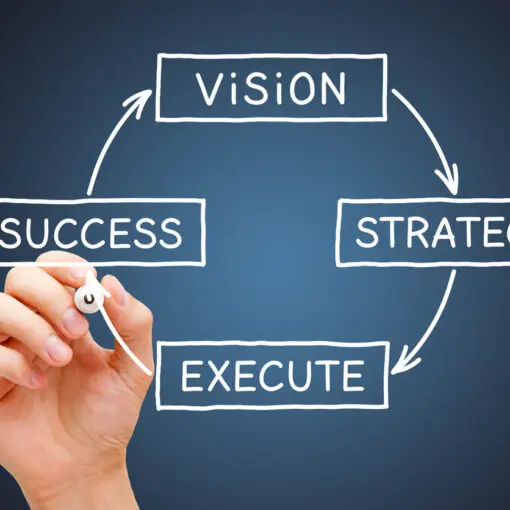Strategic thinking is a highly valued skill in today’s competitive job market. Professionals who excel at strategy planning have the ability to identify, evaluate, and solve complex problems that businesses encounter on a daily basis. These individuals possess strong characters, are excellent problem-solvers, and showcase their ability to tackle challenges, threats, and risks head-on. Consequently, careers for strategic thinkers are available in various industries, reflecting the growing demand for individuals with this skill set.
Some of the top jobs for strategic thinkers include roles in corporate strategy, management consulting, and marketing. Professionals in these positions are tasked with examining current business strategies, developing new ones, and creating actionable plans to meet or surpass company goals. A strategic mindset can set one apart in their career, demonstrating to employers that they possess not only the expertise but also the foresight to drive a business’s success.
Developing strategic thinking skills involves asking strategic questions, cultivating the ability to spot opportunities, and having a persistent focus on improving and maintaining one’s integrative thinking. With these abilities in hand, strategic thinkers are well-positioned to excel in their chosen professions and contribute significantly to their organizations’ growth and prosperity.
Fundamentals of Strategic Thinking
Defining Strategic Thinking
Strategic thinking is a rational and intentional thought process that focuses on analyzing vital variables and factors influencing long-term performance for individuals or companies. This approach includes examining market forces, leveraging available resources, and accounting for time and economic realities. It involves deliberate and creative problem-solving to achieve success.
Some aspects that indicate a strong strategic thinker are:
- Ability to anticipate future needs and trends
- Recognizing interdependencies between variables
- Continuously seeking opportunities for growth and improvement
- Embracing change and adapting to new situations
Importance in the Workplace
Strategic thinking is crucial in the workplace, as it goes beyond the everyday operational tasks. The importance of strategic thinking skills can be seen in:
- Enhancing Communication: By fostering a mindset focused on long-term objectives, organizations can improve overall communication, ensuring that all employees understand the strategic vision and goals.
- Driving Effectiveness: Employees with strong strategic thinking skills are more effective in their work. They can foresee challenges and develop suitable solutions, boosting organizational performance.
- Encouraging Creativity: Strategic thinkers promote continuous learning and curiosity, which leads to innovative ideas and creative problem-solving solutions.
- Facilitating Collaboration: When employees think strategically, they see the interconnected nature of their work and collaborate more effectively with their colleagues, breaking down silos.
Developing strategic thinking skills is essential for professional growth and success in a variety of job roles. By incorporating these habits into daily work, individuals and teams can better navigate complex issues and create value for their organizations.
Jobs Requiring Strategic Thinking
Management and Senior Leaders
Strategic thinking is crucial for management and senior leaders across various industries. Managers need to constantly assess their businesses’ position in the market and devise strategies to stay ahead of competitors. They must also focus on their teams’ productivity and personal career development. Some jobs in this category include:
- General Managers
- Operations Managers
- Chief Executive Officers
Marketing and Sales
In marketing and sales, professionals with strong strategic thinking skills are invaluable. They need to identify customer behaviors, analyze market trends, and develop marketing campaigns that effectively position their products or services. Jobs in this domain include:
- Marketing Managers
- Sales Managers
- Business Development Managers
Product Development
Strategic thinking is essential in product development to ensure that products cater to the needs of the target audience while staying competitive. Professionals in this field are responsible for researching, designing, and launching innovative solutions. Examples of positions include:
- Product Managers
- UX Designers
- R&D Engineers
Information Technology and Cybersecurity
Strategic thinkers are vital in information technology and cybersecurity, as they help organizations navigate the ever-changing landscape of technology, threats, and security measures. IT professionals should also possess a strong network of industry connections to stay informed. Job titles include:
- IT Managers
- Cybersecurity Analysts
- Network Administrators
Finance and Investment
In finance and investment, strategic thinking is essential to make sound decisions based on economic indicators, risks, and long-term goals. Strong analytical abilities, decisive thinking, and advanced knowledge of financial trends are required. Jobs in this sector include:
- Financial Analysts
- Investment Managers
- Portfolio Managers
Strategic thinking is a valuable skill set across multiple sectors, enabling individuals to make well-informed decisions that impact both the success of their organizations and their personal career trajectory.
Developing Strategic Thinking Skills
Expand Your Knowledge
Expanding your knowledge is crucial in honing your strategic thinking skills. Stay up to date on industry trends, technology advancements, and market forces to understand the broader context in which your organization operates. This will help you identify opportunities and threats while allowing you to make informed decisions based on accurate data.
Regularly reading publications, attending conferences, and participating in industry forums are great ways to stay informed and enhance your strategic perspective.
Cultivate Creative Solutions
Strategic thinkers approach problems with creativity and efficiency. Embracing a growth mindset allows you to find innovative solutions and exploit opportunities beyond traditional tactics. Encourage lateral thinking and the questioning of established practices, leading to improved productivity and organizational performance.
One way to foster creativity is by experimenting with structured brainstorming sessions, where diverse perspectives are welcomed, and unfiltered ideas can be explored freely without judgment.
Embrace Dissent and Collaboration
A key aspect of strategic thinking is welcoming differing opinions and engaging in open dialogue. This creates an environment where employees feel comfortable presenting alternative viewpoints and challenging conventional wisdom. By embracing dissent, you can expose blind spots in existing plans, uncover new perspectives, and drive long-term performance improvements.
Collaboration among employees fosters creative problem-solving, allowing people to learn from each other’s perspectives and expertise, synergizing their ideas and reaching better outcomes.
Become a Decisive Planner
Finally, to develop effective strategic thinking skills, it is essential to master the art of decisive planning. This involves setting a strategic vision, aligning the organization’s efforts, and making tough choices based on available resources and time constraints. A decisive planner is not only adaptable and responsive but also capable of prioritizing objectives while maintaining a focus on the long-term goals.
Developing strategic planning acumen requires a delicate balance of confidence, flexibility, and focus. Continually refining your decision-making abilities will empower you to execute strategies effectively and propel your organization toward success.
Benefits of Enhancing Strategic Thinking
Career Advancement
Enhancing your strategic thinking skills can lead to significant career development opportunities. By learning to analyze complex scenarios, identify patterns, and make informed decisions, you become a valuable asset to your organization. Employers recognize employees who exhibit strategic thinking and often reward them with promotions or increasing levels of responsibility. Showing a strong ability in this area, such as by asking strategic questions, can set you apart from your peers and showcase your leadership potential.
Improved Productivity and Efficiency
Strategic thinking promotes effectiveness in both individual and team performance. Being able to assess situations and determine the most efficient approach helps optimize resources and minimize wasted time. It also enables better communication within teams, as strategic thinkers can synthesize data, present clear explanations and guide others towards a shared goal. In turn, this allows for a more streamlined project execution, leading to higher productivity and efficiency within an organization.
Greater Business Success
For businesses, fostering a culture of strategic thinking contributes to overall success. A company with employees that possess strong strategic thinking skills benefits from innovation, resource optimization, and adaptability in the face of market changes and technological advancements. These individuals can spot new opportunities, develop creative solutions, and continually scan for new ways to contribute to the organization’s success, ultimately driving growth and improvement.





